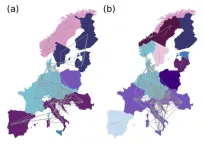(Press-News.org) EDMONTON — A new groundbreaking study sheds light on a medical question scientists have long wondered: why do 40 per cent of children with the rare neurodevelopmental disorder KBG syndrome have heart defects? The research now points to a critical link between the heart and the brain.
KBG syndrome can cause unusual facial development, skeletal abnormalities, intellectual underdevelopment and heart defects. The syndrome is caused by mutations in the ANKRD11 gene, which plays a crucial role in brain development, but it wasn’t until now that researchers at the University of Alberta also found a tie between the gene and the heart, including problems with heart valves and the walls between heart chambers.
Anastassia Voronova, an associate professor in the Faculty of Medicine and Dentistry, led the study, with cutting-edge Vizgen Merscope technology and the U of A’s Core Research Facilities team.
Voronova's team observed that mice with the ANKRD11 gene removed from their neural crest cells — a critical part of heart development — had abnormal heart formation and function, including inefficient blood circulation due to the heart’s outflow tract not properly forming, and enlarged heart ventricles which affected the heart’s ability to pump blood. Several important signalling pathways were also affected, impacting cell function and development.
This team’s research follows their previous work published earlier this year, which showed the importance of ANKRD11 to the development of brain cells. These findings in mice were also found in KBG syndrome patients, leading to the discovery of a novel clinical phenotype — the absence of smell.
The next steps are to investigate how the heart and brain influence each other’s development in children with KBG syndrome to develop better clinical care and treatment. The study's findings, along with other recent work in this area, have already started to influence clinical practices: heart evaluations are now recommended for children diagnosed with KBG syndrome.
“The problem with rare disorders is that not all patients are evaluated the same way across the world,” says Voronova. “By showing a clear role of ANKRD11 in heart development, our work paves the way for including heart evaluations in clinical guidelines across the world. This will help to ensure every child diagnosed with KBG syndrome will have their heart evaluated and corrected in a timely manner if needed.”
More information can be found here. To speak with Anastassia Voronova, please contact:
Sarah Vernon | University of Alberta communications associate | svernon@ualberta.ca
END
Groundbreaking University of Alberta study discovers connection between between heart and brain in KBG syndrome
Promising research looks at how gene mutations — already known to impact brain development — can also cause heart defects in those with the rare disorder
2024-07-02
ELSE PRESS RELEASES FROM THIS DATE:
Optoelectronics gain spin control from chiral perovskites and III-V semiconductors
2024-07-02
A research effort led by scientists at the U.S. Department of Energy’s (DOE’s) National Renewable Energy Laboratory (NREL) has made advances that could enable a broader range of currently unimagined optoelectronic devices.
The researchers, whose previous innovation included incorporating a perovskite layer that allowed the creation of a new type of polarized light-emitting diode (LED) that emits spin-controlled photons at room temperature without the use of magnetic fields or ferromagnetic contacts, now have gone a step further by integrating a III-V semiconductor ...
Doctors could soon use facial temperature for early diagnosis of metabolic diseases
2024-07-02
A colder nose and warmer cheeks may be a telltale sign of rising blood pressure.
Researchers discovered that temperatures in different face regions are associated with various chronic illnesses, such as diabetes and high blood pressure. These temperature differences are not easily perceptible by one’s own touch but can instead be identified using specific AI-derived spatial temperature patterns that require a thermal camera and a data-trained model. The results appear July 2 in the journal Cell Metabolism. With ...
Engineered plasma cells show long-lasting antileukemic activity in mice
2024-07-02
Researchers show for the first time that engineered human plasma B cells can be used to treat a disease—specifically leukemia—in a humanized animal model. The results mark a key step in the realization of ePCs as therapies to treat cancer, auto-immune disorders, and protein deficiency disorders. The results appear July 2 in the journal Molecular Therapy.
“We hope that this proof-of-concept study is the first of many applications of engineered plasma B cells, and eventually will lead to a single-shot therapeutic,” says senior study author Richard James (@ScienceRicker) of the Seattle Children’s ...
Proteins and fats can drive insulin production for some, paving way for tailored nutrition
2024-07-02
When it comes to managing blood sugar levels, most people think about counting carbs. But new research from the University of British Columbia shows that, for some, it may be just as important to consider the proteins and fats in their diet.
The study, published today in Cell Metabolism, is the first large-scale comparison of how different people produce insulin in response to each of the three macronutrients: carbohydrates (glucose), proteins (amino acids) and fats (fatty acids).
The findings reveal that production of the blood sugar-regulating hormone insulin is much more dynamic and individualized than previously ...
Melting of Alaskan glaciers accelerating faster than previously thought
2024-07-02
Melting of glaciers in a major Alaskan icefield has accelerated and could reach an irreversible tipping point earlier than previously thought, new research suggests.
The research, led by scientists at Newcastle University, UK, found that glacier loss on Juneau Icefield, which straddles the boundary between Alaska and British Columbia, Canada, has increased dramatically since 2010.
The team, which also included universities in the UK, USA and Europe, looked at records going back to 1770 and identified three distinct periods in how icefield volume changed. They saw that glacier volume loss remained fairly ...
Genetic study points to oxytocin as possible treatment for obesity and postnatal depression
2024-07-02
Scientists have identified a gene which, when missing or impaired, can cause obesity, behavioural problems and, in mothers, postnatal depression. The discovery, reported today in Cell, may have wider implications for the treatment of postnatal depression, with a study in mice suggesting that oxytocin may alleviate symptoms.
Obesity and postnatal depression are significant global health problems. Postnatal depression affects more than one in 10 women within a year of giving birth and is linked to an increased risk of ...
What was behind the 2021-2022 energy crisis within Europe?
2024-07-02
WASHINGTON, July 2, 2024 – An energy crisis hit Europe in 2021-2022, following Russia’s invasion of Ukraine, which sent electricity prices skyrocketing — even within countries that don’t rely on Russian gas. It begs the question: Was there more to it?
A team of researchers from the Institute for Energy and Climate Research at Forschungszentrum Jülich, the University of Cologne, and the Norwegian University of Life Sciences had already been working with electricity price data for years, exploring statistics and developing forecasting methods. Adopting a European perspective, ...
Alterations in human gene TRPC5 cause obesity and postpartum depression
2024-07-02
Researchers at Baylor College of Medicine, the University of Cambridge and collaborating institutions have discovered that alterations in the human gene TRPC5 cause obesity and postpartum depression.
Taken together, their studies in cells, animal models and humans showed that TRPC5 acts on distinct neuronal populations in the hypothalamus, a brain region that regulates multiple innate behaviors including feeding, anxiety, socialization and maternal care. The findings, published in the journal Cell, ...
In-hospital delirium and disability and cognitive impairment after COVID-19 hospitalization
2024-07-02
About The Study: In this cohort study of 311 hospitalized older adults with COVID-19, in-hospital delirium was associated with increased functional disability and cognitive impairment over the 6 months following discharge. Older survivors of a COVID-19 hospitalization who experience in-hospital delirium should be assessed for disability and cognitive impairment during postdischarge follow-up.
Corresponding author: To contact the corresponding author, Lauren E. Ferrante, M.D., M.H.S., email lauren.ferrante@yale.edu.
To access the embargoed study: Visit our For The Media website at this link https://media.jamanetwork.com/
(doi: 10.1001/jamanetworkopen.2024.19640)
Editor’s ...
E-cigarette use and lung cancer screening uptake
2024-07-02
About The Study: In this cross-sectional study, e-cigarette use was independently associated with lower use of lung cancer screening, particularly among individuals who had quit smoking combustible cigarettes. Emerging research suggests that e-cigarettes contain definite and probable carcinogens and cause similar cancer-associated gene deregulations as combustible tobacco.
Corresponding author: To contact the corresponding author, Qian Wang, M.D., M.P.H., email qian.wang@uhhospitals.org.
To access the embargoed study: Visit our For The Media website at this link https://media.jamanetwork.com/
(doi: ...
LAST 30 PRESS RELEASES:
Kidney cancer study finds belzutifan plus pembrolizumab post-surgery helps patients at high risk for relapse stay cancer-free longer
Alkali cation effects in electrochemical carbon dioxide reduction
Test platforms for charging wireless cars now fit on a bench
$3 million NIH grant funds national study of Medicare Advantage’s benefit expansion into social supports
Amplified Sciences achieves CAP accreditation for cutting-edge diagnostic lab
Fred Hutch announces 12 recipients of the annual Harold M. Weintraub Graduate Student Award
Native forest litter helps rebuild soil life in post-mining landscapes
Mountain soils in arid regions may emit more greenhouse gas as climate shifts, new study finds
Pairing biochar with other soil amendments could unlock stronger gains in soil health
Why do we get a skip in our step when we’re happy? Thank dopamine
UC Irvine scientists uncover cellular mechanism behind muscle repair
Platform to map living brain noninvasively takes next big step
Stress-testing the Cascadia Subduction Zone reveals variability that could impact how earthquakes spread
We may be underestimating the true carbon cost of northern wildfires
Blood test predicts which bladder cancer patients may safely skip surgery
Kennesaw State's Vijay Anand honored as National Academy of Inventors Senior Member
Recovery from whaling reveals the role of age in Humpback reproduction
Can the canny tick help prevent disease like MS and cancer?
Newcomer children show lower rates of emergency department use for non‑urgent conditions, study finds
Cognitive and neuropsychiatric function in former American football players
From trash to climate tech: rubber gloves find new life as carbon capturers materials
A step towards needed treatments for hantaviruses in new molecular map
Boys are more motivated, while girls are more compassionate?
Study identifies opposing roles for IL6 and IL6R in long-term mortality
AI accurately spots medical disorder from privacy-conscious hand images
Transient Pauli blocking for broadband ultrafast optical switching
Political polarization can spur CO2 emissions, stymie climate action
Researchers develop new strategy for improving inverted perovskite solar cells
Yes! The role of YAP and CTGF as potential therapeutic targets for preventing severe liver disease
Pancreatic cancer may begin hiding from the immune system earlier than we thought
[Press-News.org] Groundbreaking University of Alberta study discovers connection between between heart and brain in KBG syndromePromising research looks at how gene mutations — already known to impact brain development — can also cause heart defects in those with the rare disorder

